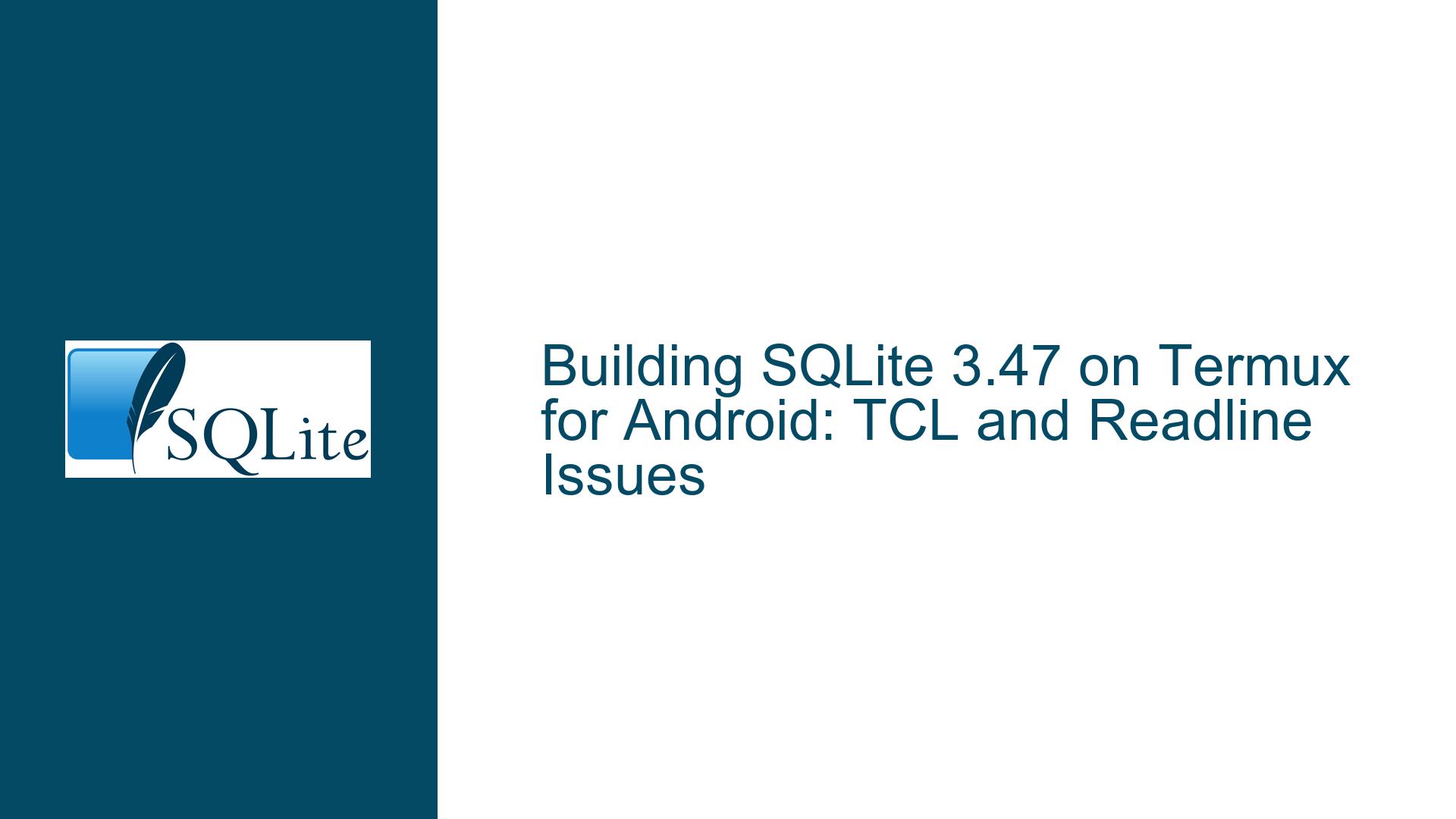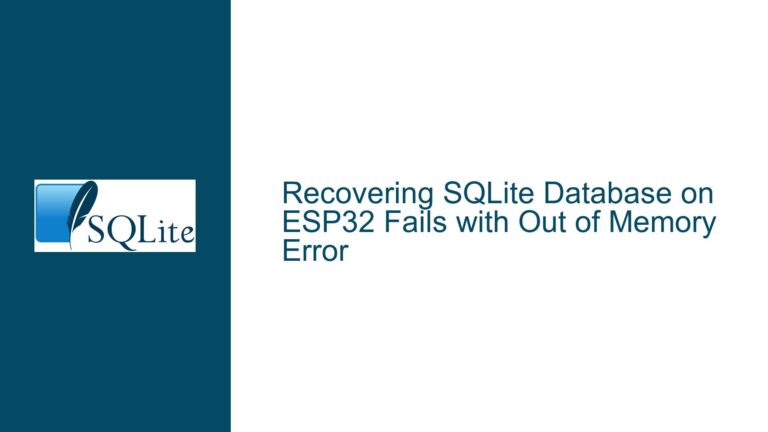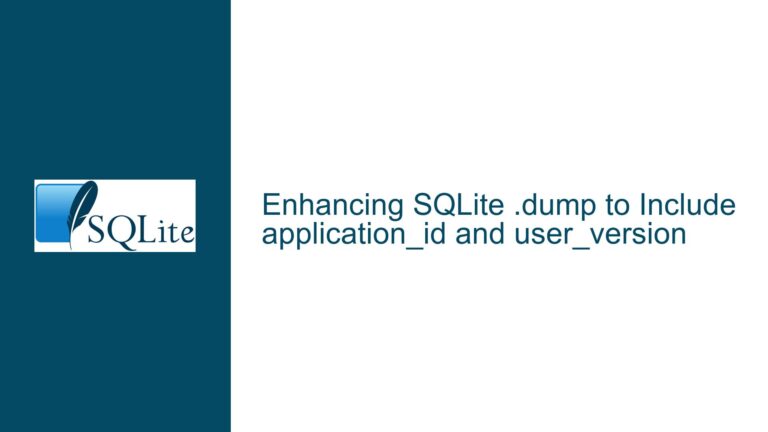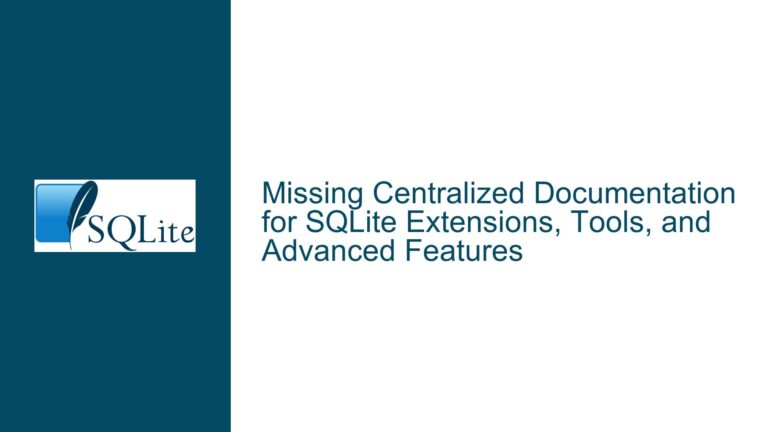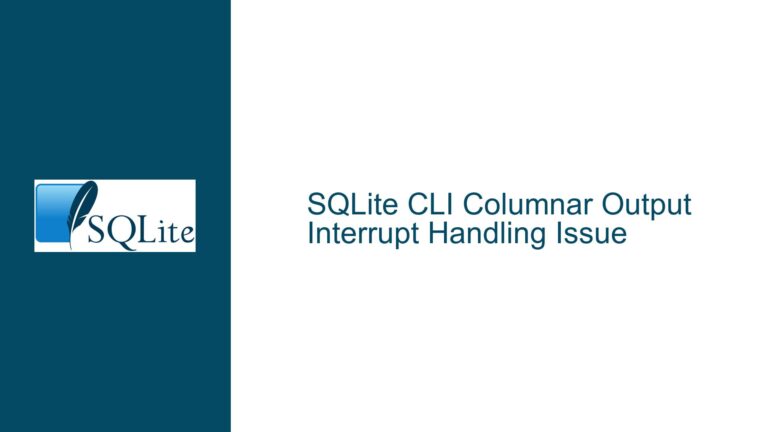Building SQLite 3.47 on Termux for Android: TCL and Readline Issues
Issue Overview: TCL Dependency and Readline Configuration in SQLite 3.47 Build on Termux
Building SQLite 3.47 on Termux for Android presents two primary challenges: the handling of TCL dependencies and the configuration of Readline support. The build process fails due to a combination of syntax errors in the configure script related to TCL detection and the improper handling of compiler flags, specifically the omission of -fPIC when overriding CFLAGS. Additionally, the SQLite shell lacks Readline support due to misconfigured header paths, which prevents the shell from providing line-editing capabilities.
The core issue stems from the configure script’s reliance on TCL for code generation, even when TCL is explicitly disabled using the --disable-tcl flag. This dependency is not eliminated by the flag, leading to errors when the required TCL tools are not found. Furthermore, the build system’s handling of compiler flags, particularly -fPIC, is disrupted when users override CFLAGS, causing linker errors related to position-independent code. Finally, the Readline detection mechanism fails to locate the necessary header files, resulting in a SQLite shell without line-editing functionality.
Possible Causes: TCL Syntax Errors, Compiler Flag Overrides, and Readline Header Misconfiguration
The first major cause of the build failure is the configure script’s use of the == operator in shell test commands. While this operator is widely supported, it is not universally accepted across all shell implementations, particularly in the Termux environment. This leads to syntax errors during the configuration phase, specifically when checking for TCL dependencies. The errors manifest as "unexpected operator" messages, halting the configuration process and preventing the build from proceeding.
The second cause is the improper handling of compiler flags when users override CFLAGS. The SQLite build system includes -fPIC in its default CFLAGS to ensure the generation of position-independent code, which is essential for shared libraries. However, when users override CFLAGS to customize optimization or debugging settings, the -fPIC flag is inadvertently dropped. This results in linker errors, as the generated object files are not compatible with the shared library linking process. The errors specifically mention relocations that cannot be used against certain symbols, indicating the absence of position-independent code.
The third cause is the misconfiguration of Readline support. The configure script fails to locate the readline.h header file, which is necessary for enabling line-editing capabilities in the SQLite shell. This failure occurs because the header file is located in a non-standard directory within the Termux environment. Without the correct header path, the build process disables Readline support, resulting in a shell that lacks essential features like command history and line editing.
Troubleshooting Steps, Solutions & Fixes: Correcting TCL Syntax, Preserving Compiler Flags, and Configuring Readline
To resolve the TCL-related syntax errors, modify the configure script to replace instances of == with = in test commands. Specifically, locate the lines containing if test x"${with_tclsh}" == x -a x"${with_tcl}" == x; then and if test x"$TCLSH_CMD" == x; then, and change the == operators to =. This ensures compatibility with the Termux shell and allows the configuration process to proceed without errors. After making these changes, re-run the configure script with the --disable-tcl flag to verify that the TCL dependency checks no longer cause syntax errors.
To address the compiler flag issue, avoid overriding CFLAGS directly when invoking make. Instead, use CPPFLAGS to pass additional flags, as this preserves the default CFLAGS set by the build system, including -fPIC. For example, use make "CPPFLAGS= -O2 -DSQLITE_OS_UNIX=1" to apply custom optimization settings without disrupting the generation of position-independent code. If you must override CFLAGS, explicitly include -fPIC in the flags to ensure compatibility with shared library linking. For example, use make "CFLAGS= -fPIC -O2 -DSQLITE_OS_UNIX=1" to retain position-independent code generation while applying custom settings.
To enable Readline support, manually specify the path to the readline.h header file during the configuration process. Use the --with-readline-header flag to provide the full path to the header file, ensuring that the configure script can locate it. For example, use ../configure --disable-tcl --with-readline-header=/data/data/com.termux/files/usr/include/readline/readline.h to point the script to the correct header location. After configuring, proceed with the build as usual. Verify that the resulting SQLite shell includes Readline support by checking for line-editing capabilities.
If Readline support is still not enabled, consider using libedit as an alternative to libreadline. libedit provides a compatible API and can be used as a drop-in replacement for libreadline. To configure SQLite to use libedit, specify the path to the editline/readline.h header file and link against libedit using the --with-readline-ldflags=-ledit flag. For example, use ../configure --with-readline-header=/data/data/com.termux/files/usr/include/editline/readline.h --with-readline-ldflags=-ledit to configure the build for libedit. Alternatively, use the --editline flag to enable automatic detection of libedit, though this may fail in the Termux environment due to non-standard header locations.
By addressing these issues systematically, you can successfully build SQLite 3.47 on Termux for Android with full functionality, including TCL-independent code generation, proper handling of compiler flags, and Readline support in the SQLite shell. These solutions ensure a robust and feature-complete build, enabling you to leverage SQLite’s capabilities in your Android development environment.
